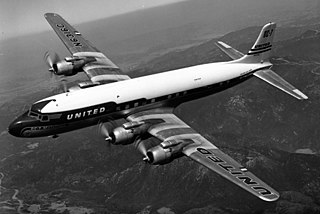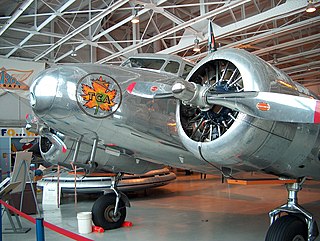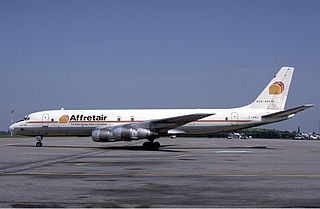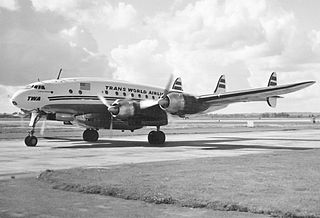Related Research Articles

The Lockheed Constellation ("Connie") is a propeller-driven, four-engined airliner built by Lockheed Corporation starting in 1943. The Constellation series was the first civil airliner family to enter widespread use equipped with a pressurized cabin, enabling it to fly well above most bad weather, thus significantly improving the general safety and ease of commercial passenger air travel.

The Douglas DC-6 is a piston-powered airliner and cargo aircraft built by the Douglas Aircraft Company from 1946 to 1958. Originally intended as a military transport near the end of World War II, Douglas reworked it after the war to compete with the Lockheed Constellation in the long-range commercial transport market. Douglas built over 700, and many still fly in cargo, military, and wildfire control roles.

The Douglas DC-7 is an American transport aircraft built by the Douglas Aircraft Company from 1953 to 1958. A derivative of the DC-6, it was the last major piston engine-powered transport made by Douglas, being developed shortly after the earliest jet airliner—the de Havilland Comet—entered service and only a few years before the jet-powered Douglas DC-8 first flew in 1958. Larger numbers of both DC-7B and DC-7C variants were also built.

The Douglas DC-4 is an American four-engined (piston), propeller-driven airliner developed by the Douglas Aircraft Company. Military versions of the plane, the C-54 and R5D, served during World War II, in the Berlin Airlift and into the 1960s. From 1945, many civil airlines operated the DC-4 worldwide.
Capitol Air was a United States supplemental air carrier and, after 1978, a scheduled passenger air carrier based which was operational from 1946 to its bankruptcy filing on November 23, 1984. It was founded as Capitol Airways in 1946, and then renamed Capitol International Airways in 1967. In 1981, the airline changed its name to Capitol Air and was operating scheduled domestic and international passenger flights that year.

This is a list of aviation-related events from 1960.

Trans-Canada Air Lines was a Canadian airline that operated as the country's flag carrier, with corporate headquarters in Montreal, Quebec. Its first president was Gordon Roy McGregor. Founded in 1937, it was renamed Air Canada in 1965.
Trans International Airlines (TIA) started as a United States supplemental air carrier, at the time the regulatory term for a charter airline. After US airline deregulation in 1979, it also operated scheduled passenger service flying as Transamerica Airlines as well as charter flights during its last decade. Its headquarters were at Oakland International Airport (OAK) in Oakland, California.

Saturn Airways was a US supplemental air carrier, certificated as such by the Civil Aeronautics Board (CAB), the now-defunct Federal agency that, at the time, tightly regulated almost all US air transport. Saturn operated from 1948 until 1976. Originally a Florida company, Saturn moved to Oakland, California in 1967 where its headquarters were located on the grounds of Oakland International Airport.

Affretair was a cargo airline based in Zimbabwe.

Afro-Continental Airways (ACA) was a subsidiary of Air Trans Africa, formed by Jack Malloch to operate a service between Salisbury, Rhodesia and Windhoek, South West Africa, and Malawi with a Lockheed L1049G Super Constellation acquired from Varig Brazilian Airlines.
Slick Airways was a cargo airline from the United States, that operated scheduled and chartered flights between 1946 and 1966. The airline was founded by Earl Slick, a Texas aviator and multimillionaire who along with his brother had inherited $25 million after their father's death in 1930.
The Lockheed Model 44 Excalibur was a proposed American airliner designed by Lockheed. The Model 44 was the first four-engined design from the company, a low-wing monoplane with a retractable tricycle landing gear. Originally fitted with twin fins, the design ended up with three fins. It was to be powered by four 1,200 hp (890 kW) Pratt & Whitney Twin Wasp radial engines. Pan American Airways was close to ordering the Excalibur when Lockheed abandoned the project to devote its resources to developing the Model 49 Constellation that had been ordered by Trans World Airlines.

The Lockheed L-1649 Starliner is the last model of the Lockheed Constellation line of airliners. Powered by four Wright R-3350 TurboCompound engines, it was built at Lockheed's Burbank, California plant from 1956 to 1958.

The Lockheed L-1049 Super Constellation is an American aircraft, a member of the Lockheed Constellation aircraft line. The aircraft was colloquially referred to as the Super Connie.

The Lockheed L-049 Constellation was the first model of the Lockheed Constellation aircraft line. It entered service as the C-69 military transport aircraft during World War II for the United States Army Air Forces and was the first civilian version after the war. When production ended in 1946 it was replaced by the improved L-649 and L-749 Constellation.

The Lockheed L-749 Constellation is the first Lockheed Constellation to regularly cross the Atlantic Ocean non-stop. Although similar in appearance to the L-649 before it, the L-749 had a larger fuel capacity, strengthened landing gear, and eventually weather radar.
John McVicar Malloch ICD, was a South African-born Rhodesian bush pilot, gun-runner and sanctions-buster who flew in World War II and in various legal and illegal roles around Africa and the Middle East until the early 1980s. In 1978, he was the final recipient of the Rhodesian civil Independence Commemorative Decoration for services rendered to the country.
References
Air Trans Africa photos and info to be found in this website. Www.a2oxford.info
- ↑ "The Crash of NAF 911". www.dawodu.com. Retrieved 6 September 2017.